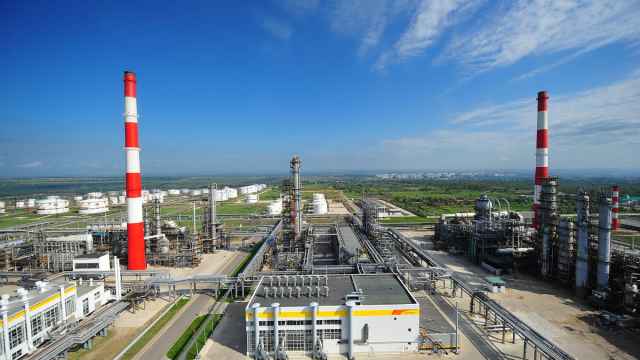A Russian train car producer has gained access to innovative technology that will allow trains to carry heavier loads of freight.
Obedinennaya Vagonnaya Kompania (United Wagon Company) signed an agreement with the U.S. company Amsted Rail and received full intellectual property rights to its Motion Control bogie design, which the Russian manufacturer can also license to other companies, Vedomosti reported.
The partners also agreed to establish a joint venture for designing and manufacturing freight car components.
AR earlier offered the rail car technology to another wagon company, Uralvagonzavod, but it claimed test performance was unsatisfactory and decided to use its own designs.
The new model, which can accommodate loads up to 25 tons per axle, was specifically adapted by AR engineers for freight railcars operating on the 1520 millimeter gauge tracks used in Russia and other CIS countries.
Conventional freight wagons have a lower axle load, with average upper limits of around 23 tons.
Heavier freight load means lower transportation costs for carriers but will require rail infrastructure upgrades.
The government has prepared a program of heavy freight transport development in Russia and is considering granting discounts to companies that buy wagons capable of carrying heavier load, news reports said.
Transportation Minister Maxim Sokolov said earlier that increasing railway load capacity on tracks between the coal mining region of Kuzbass and Russia's sea ports should be considered a government priority.
Coal is the main freight transported via Russian Railways and the cargo is a vital source of income for the train monopoly.
Although traffic of iron-based metals, construction materials, grain and other goods saw a decline in volumes according to company's most recent half year results, coal operations saw low, steady growth.
A Message from The Moscow Times:
Dear readers,
We are facing unprecedented challenges. Russia's Prosecutor General's Office has designated The Moscow Times as an "undesirable" organization, criminalizing our work and putting our staff at risk of prosecution. This follows our earlier unjust labeling as a "foreign agent."
These actions are direct attempts to silence independent journalism in Russia. The authorities claim our work "discredits the decisions of the Russian leadership." We see things differently: we strive to provide accurate, unbiased reporting on Russia.
We, the journalists of The Moscow Times, refuse to be silenced. But to continue our work, we need your help.
Your support, no matter how small, makes a world of difference. If you can, please support us monthly starting from just $2. It's quick to set up, and every contribution makes a significant impact.
By supporting The Moscow Times, you're defending open, independent journalism in the face of repression. Thank you for standing with us.
Remind me later.





